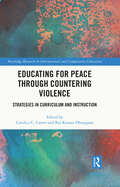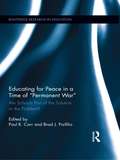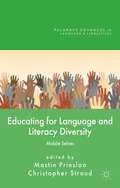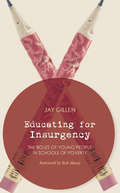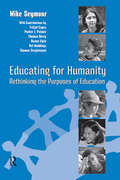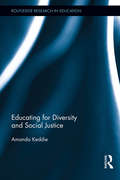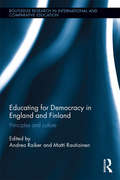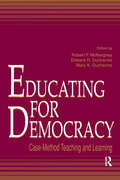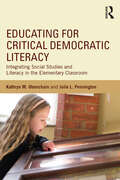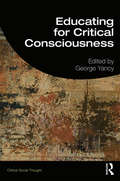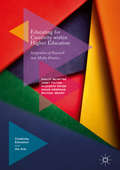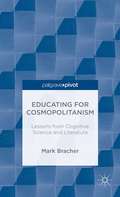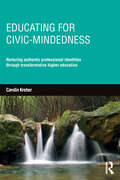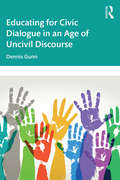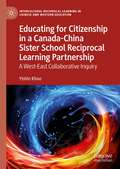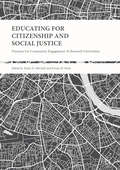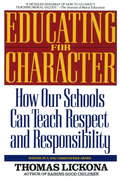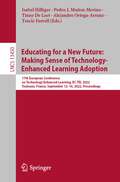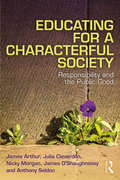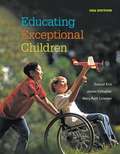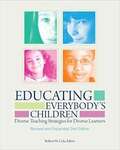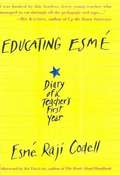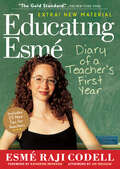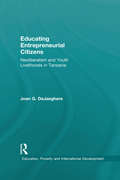- Table View
- List View
Educating for Peace through Countering Violence: Strategies in Curriculum and Instruction (Routledge Research in International and Comparative Education)
by Candice C. Carter Raj Kumar DhunganaThis book advances knowledge about the implementation of peace and non-violence strategies in education that counter violence. Addressing both hidden and direct violence, it examines the harm to wellbeing and learning through a unique exploration of the role of teachers, and confronts the roots of violence in educational settings. Presenting and critiquing a range of pedagogical tools, case examples, and research, it examines how various methods can be used for identifying and proactively responding to conflicts such as injustice, discrimination, and prejudice, among others. Contributors present case studies from a range of global contexts and offer cutting-edge research on the applications of these resources, and how they contextualize peace education. An essential read for educators, teacher educators and peace scholars, it crucially offers pathways for confronting and healing from violence in both formal and informal sites of education.
Educating for Peace in a Time of Permanent War: Are Schools Part of the Solution or the Problem? (Routledge Research in Education)
by Paul R. Carr Brad J. PorfilioWhat is the meaning of peace, why should we study it, and how should we achieve it? Although there are an increasing number of manuscripts, curricula and initiatives that grapple with some strand of peace education, there is, nonetheless, a dearth of critical, cross-disciplinary, international projects/books that examine peace education in conjunction with war and conflict. Within this volume, the authors contend that war/military conflict/violence are not a nebulous, far-away, mysterious venture; rather, they argue that we are all, collectively, involved in perpetrating and perpetuating militarization/conflict/violence inside and outside of our own social circles. Therefore, education about and against war can be as liberating as it is necessary. If war equates killing, can our schools avoid engaging in the examination of what war is all about? If education is not about peace, then is it about war? Can a society have education that willfully avoids considering peace as its central objective? Can a democracy exist if pivotal notions of war and peace are not understood, practiced, advocated and ensconced in public debate? These questions, according to Carr and Porfilio and the contributors they have assembled, merit a critical and extensive reflection. This book seeks to provide a range of epistemological, policy, pedagogical, curriculum and institutional analyses aimed at facilitating meaningful engagement toward a more robust and critical examination of the role that schools play (and can play) in framing war, militarization and armed conflict and, significantly, the connection to peace.
Educating for Language and Literacy Diversity
by Mastin Prinsloo Christopher StroudEducators and researchers in variety of locations increasingly encounter linguistically and socio-culturally diverse groups of students in their classrooms and lecture halls. This book examines everyday forms of talk and writing in relation to standardised forms and schooling expectations to suggest ways forward in educational discourse.
Educating for Language and Literacy Diversity: Mobile Selves (Palgrave Advances In Language And Linguistics Ser.)
by Mastin Prinsloo Christopher StroudEducators and researchers in variety of locations increasingly encounter linguistically and socio-culturally diverse groups of students in their classrooms and lecture halls. This book examines everyday forms of talk and writing in relation to standardised forms and schooling expectations to suggest ways forward in educational discourse.
Educating for Insurgency
by Bob Moses Jay GillenA manifesto for today's broken schools.Desegregation has failed. Schools filled with black and brown students have become plantations of social control, where the policing of behavior trumps the expanding of minds. Radical teachers and organizers in American public schools must help young people fashion an insurgency. That means, at the very least, seeing each student's rebellion not as violation, but as communication.Jay Gillen writes with passion and compassion about the daily lives of poor students trapped in institutions that dismiss and degrade them. In the spirit of Paulo Freire, and using the historical models of slave rebellions and Civil Rights struggles as guides, Gillen explains what sort of insurgency is needed and how to create it: the tools and techniques required to build social, intellectual, and political power.This poetic manifesto of revolutionary "educational reform" belongs in the pocket of anyone who currently works in, suffers through, or simply cares about public schooling in this country.Jay Gillen teaches English in a Baltimore public school and has worked with the Baltimore Algebra Project since 1995, building math literacy among youth of color and youth experiencing poverty in US public schools.Bob Moses is an educator and Civil Rights activist. He founded the Algebra Project in 1982.
Educating for Humanity: Rethinking the Purposes of Education
by Mike Seymour Henry M. LevinAt a time of profound crises around the world, when social justice, peace, democracy and the environment seem under increasing threat, the promise of "a world for all" seems a viable aspiration for education. Ample evidence from many schools today, and dating back throughout the last century, prove that the purpose of educating young people to develop character, compassion, purpose and commitment is integral with the mastery of intellectual skills and life competencies. Schooling, without a doubt, can play a monumental part in the development of the personal values people take with them to the world. Unfortunately, as the saying goes, "if you don't know where you're going, you'll probably get someplace else." Educational policy directions over the last twenty years have veered far away from the important work of educating for humanity. This book makes a powerful appeal to revisit educational purpose in light of what is most fundamental and important to human beings everywhere. The authors address timely issues such as high stakes testing, school choice, and privatization of education in looking beyond these measures to new approaches to educational excellence.
Educating for Diversity and Social Justice (Routledge Research in Education)
by Amanda KeddieEducating for Diversity and Social Justice foregrounds the personal stories of educators who are engaging the space of schooling as a site of possibility for realizing the goals of social justice. It is a book inspired by a vision of education as a practice of freedom where young people – especially those who are marginalized – can learn that they have a voice and the power to change their world for the better. Drawing on the work of US philosopher Nancy Fraser, the book examines issues of justice and schooling in relation to three dimensions: political, cultural and economic. While its focus is on research within three Australian case study schools, the book provides an international perspective of these dimensions of justice in western education contexts as they impact on the schooling performance of marginalized students. Towards greater equity for these students, the book presents a comprehensive scaffold for thinking about and addressing issues of schooling, diversity and social justice. Through practical examples from the case study research, the book illustrates the complexities and possibilities associated with schools providing inclusive environments where marginalized voices are heard (political justice), where marginalized culture is recognized and valued (cultural justice) and where marginalized students are supported to achieve academically towards accessing the material benefits of society (economic justice).
Educating for Democracy in England and Finland: Principles and culture (Routledge Research in International and Comparative Education)
by Matti Rautiainen Andrea RaikerWith the growth of terrorism, instability in the EU following recession, and the acceleration of support for right-wing political parties in Europe, discussions on the nature of democracy and democratic citizenship have never been more important. Exploring the relationship between democratic values, classroom practices and neo-liberalist ideology in England and in Finland, Educating for Democracy argues that it is the role of governments and the education systems they support to create teachers and students who can voice critically appraised judgements to guide their citizenship. With chapters co-written by English and Finnish authors, this book analyses the history and current state of education systems in England and Finland, with reference to other European countries, in order to establish whether they are effective in creating democratically-minded citizens. Recent years have seen decreasing control of educator professionalism as governments have become more concerned about economic growth, and in some cases, survival. The contributors to this volume question whether educators are becoming less effectual as a result, exploring the idea that democracy is a dying concept, and asking whether educators are now simply creating cogs for the neo-liberalistic/capitalist machine. This book will be essential reading for academics and researchers in the fields of teacher education, education studies and comparative education. It will also be of great interest to those concerned with issues surrounding citizenship, democracy and the role of the government in education.
Educating for Democracy: Case-method Teaching and Learning
by Robert F. McNergney Edward R. Ducharme Mary K. DucharmeThis book advocates the use of case methods to promote democratic teaching and learning. Part I speaks directly to teacher educators. The chapters in this part suggest how and why they might use case methods at pre- and in-service levels. Part II presents a set of cases and teaching notes designed to stimulate active consideration of democratic teaching and learning in elementary and secondary schools throughout the United States. These cases can be used with both prospective and practicing teachers. Case methods in education--like those used to prepare practitioners in other professions such as medicine, law, and business--require learners to attend to detail and to exercise judgment as they identify and solve problems. Although each has its own unique variations, case-method approaches in all fields promote careful examination of professional practice. The cases in this book will help teacher educators think anew about many issues related to teaching and learning with cases.
Educating for Critical Democratic Literacy: Integrating Social Studies and Literacy in the Elementary Classroom
by Julie L. Pennington Kathryn M. ObenchainEducating for Critical Democratic Literacy educates pre and in-service elementary school teachers in teaching four key civics concepts through social studies and literacy integration. Written together by both literacy and social studies experts, it is based on a conceptual revision of the notions of civic education and critical literacy called "Critical Democratic Literacy" (CDL). The authors’ dual expertise allows them to effectively detail the applications of their knowledge for teachers, from lesson conception to implementation to assessment. Part I explains the theory and basic principles of CDL and provides background information on the role of democracy in education. Part II consists of four sample lessons designed using the National Council for the Social Studies (NCSS) C3 Framework and the Common Core State Standards for English/Language Arts (CSS ELA) standards. Part III includes a primer explaining the four civic concepts that frame the book. Fully aligned to both the CCSS ELA and NCSS C3 Framework, this timely resource provides future and current teachers with specific lessons and tools, as well as the skills to develop their own rigorous, integrated units of study.
Educating for Critical Consciousness (Critical Social Thought)
by George YancyIn this politically and democratically urgent collection, George Yancy and contributors argue that more than ever, we are in need of classrooms that function "dangerously"—that is, classrooms where people are not afraid to engage in critical discussions that call into question difficult political times. Collectively they demonstrate the ways activist authors and scholars must be prepared to engage in risk and vulnerability as a defense of our democratic right to practice forms of pedagogical transgression. Ideal for scholars and students of critical pedagogy, philosophy of education, and political theory, this collection delineates the necessity of critical consciousness through education, and provides ways of speaking back against authoritarian control of imaginative and critical capacities.
Educating for Creativity within Higher Education: Integration of Research into Media Practice (Creativity, Education and the Arts)
by Phillip McIntyre Janet Fulton Elizabeth Paton Susan Kerrigan Michael MeanyThis book provides innovative insights into how creativity can be taught within higher education. Preparing students for employment in a dynamic set of global creative industries requires those students to not only be resilient and entrepreneurial, but also to be locally focused while being globally aware. Therefore it is imperative that they acquire a thorough understanding of creative processes and practice as they try to keep pace with worldwide digital trends. As the creation of media messages is a fundamental aspect of global creative industries, and that numerous concerns practitioners face are based upon a certain understanding of creativity, the authors propose an exploration of what creativity is in terms of research, and then apply it pedagogically. Drawing on extensive empirical research, the authors pose the thought-provoking question of whether creativity can be taught. This volume will be of interest to both students and scholars of creativity and higher education as well as to creatively-based practitioners more widely.
Educating for Cosmopolitanism: Lessons from Cognitive Science and Literature
by Mark BracherDrawing on developments in cognitive science, Bracher formulates pedagogical strategies for teaching literature in ways that develop students' cognitive capabilities for cosmopolitanism, the pursuit of global equality and justice. Several staple classroom texts, such as Things Fall Apart, provide detailed examples for teaching practices.
Educating for Civic-mindedness: Nurturing authentic professional identities through transformative higher education
by Carolin KreberImagined at their best, how might professions contribute most effectively to their local and global communities, and how could higher education support graduates/future professionals in making this contribution? The answer proposed in this book is to educate students for ‘civic-mindedness’, an overarching professional capability grounded in certain dispositions and qualities, ideals, types of knowledge and political emotions. ‘Civic-mindedness’, and its internal counterpart, the practitioner’s self-cultivation, give rise to an engagement with professional practice that is authentic, civic and democratic. The tension between responsiveness or regard for others and regard for self is overcome by recognising that authentic professional identities are constructed through practices around shared purposes and ideals. Drawing on a wide range of theorists including Dewey, Arendt, and Nussbaum, professions are envisaged to play a vital role. Primarily professions support society’s well-being by ensuring access to public goods, such as local and global justice, access to information, health, education, safety, housing, the beauty and sustaining power of the ecological environment, among others. Yet professions also protect the fundamental good of citizen participation in free deliberation and decision-making on issues affecting their lives. The book concludes with a vision of higher education that is transformative of graduates/professionals, pedagogies, professional practices and communities. Issues of increasing social awareness are a key concern for anyone involved in teaching professionals and this book, which builds best practice around a sound theoretical and philosophical framework, will prove both thought-provoking and practical in application.
Educating for Civic Dialogue in an Age of Uncivil Discourse
by Dennis GunnEducating for Civic Dialogue in an Age of Uncivil Discourse addresses an urgent challenge—to help students learn the skills of civic engagement—by offering a framework for authentic cosmopolitan education. As an invitation to ongoing civil dialogue with diverse voices in the classroom, the book aims to foster the skills of democratic and global citizenship that allow students to find their voice as local, national, and global citizens outside of the classroom. It suggests practical ways that teachers can promote the skills of attentive listening, intelligent questioning, reasonable positioning, and responsible dialogue in order to encourage authentic civic discourse. It also outlines specific pedagogical strategies designed to foster students’ cosmopolitan competencies as democratic and global citizens.
Educating for Citizenship in a Canada-China Sister School Reciprocal Learning Partnership: A West-East Collaborative Inquiry (Intercultural Reciprocal Learning in Chinese and Western Education)
by Yishin KhooThis book enriches the discourse around Global Citizenship Education in teacher education through the example of a teacher's experience in a Canada-China Sister School reciprocal learning landscape. Instead of positioning global citizenship teaching and learning as a set of fixed goals to be attained by teachers alone, this book approaches global citizenship teaching and learning as unfinished lifework in progress and as situated curriculum problems to be inquired together by university researchers, school teachers, and students under the spirit of reciprocity and community. This reimagination of narratives, theory, and action start from collaborative and reciprocal learning partnerships among Chinese and Canadian researchers and teachers in the practicality of re-searching and re-enacting the purpose and meanings of twenty-first century education in a Canada-China Sister School setting.
Educating for Citizenship and Social Justice
by Tania D. Mitchell Krista M. SoriaIn this edited volume, authors explore the ways in which departments, programs, and centers at public research universities are working to better engage students in the work of citizenship and social justice. The chapters in this book illuminate the possibilities and challenges for developing community engagement experiences and provide evidence of the effects of these efforts on communities and undergraduate students' development of citizenship outcomes. This text reveals how important the integration of our intentions and actions are to create a community engaged practice aimed towards justice.
Educating for Character: How Our Schools Can Teach Respect and Responsibility
by Thomas LickonaThe first paperback publication of an award-winning study on the need for values in education in American classrooms--from the author of the parenting classic Raising Good Children. Drawing on 20 years of research, Dr. Lickona cuts through the controversy to report on scores of practical, successful programs that are turning schools around.
Educating for a New Future: 17th European Conference on Technology Enhanced Learning, EC-TEL 2022, Toulouse, France, September 12–16, 2022, Proceedings (Lecture Notes in Computer Science #13450)
by Isabel Hilliger Pedro J. Muñoz-Merino Tinne De Laet Alejandro Ortega-Arranz Tracie FarrellThis book constitutes the proceedings of the 17th European Conference on Technology Enhanced Learning, EC-TEL 2022, held in Toulouse, France, in September 2022.The 30 research papers and 31 demo and poster papers presented in this volume were carefully reviewed and selected from 109 submissions. Chapter “Learners’ Strategies in Interactive Sorting Tasks” is available open access under a CC BY 4.0 license.
Educating for a Characterful Society: Responsibility and the Public Good
by James Arthur Julia Cleverdon Nicky Morgan James O'Shaughnessy Anthony SeldonThe UK National Curriculum states that schools should reaffirm commitment to the virtues of truth, justice, honesty, trust and a sense of duty. This aim, loosely defined as 'character' education, is widely agreed to be critical to healthy development and a fair, just and democratic society. But what exactly is 'character' and how best to educate for it? This vitally important book, written by five internationally prominent figures and government advisers, aims to answer that question. Accessibly written and brimming with inspirational ideas, it looks at questions of research, education, government policy and societal engagement with character, including in the light of COVID-19 and the huge debt owed to the public services frontline. This book is a fascinating and vital read for parents, teachers and anyone concerned with social justice, developing the energy and passion of young people and working towards a better, stronger, fairer society. This could very well be the most important book you read all year!
Educating Exceptional Children
by Samuel Kirk Mary Ruth Coleman James J. GallagherAuthored by luminaries in the special education field, EDUCATING EXCEPTIONAL CHILDREN introduces readers to each of the thirteen disability categories, and to the needs of children who are gifted and talented. The fourteenth edition continues to focus on the strengths of previous editions, while also providing new material about such important hot topics as genetics, neurology, inclusion, assistive technology, and information processing. The book provides key, research-based teaching methods and strategies for children with various exceptionalities, and also offers analysis of ecological factors that influence the exceptional child in and out of the classroom. This edition also features a new chapter on children with ADD/ADHD, new diagnosis information from the DSM-5, coverage of CEC and Common Core State Standards, the most current teaching techniques for each category, and current coverage of the Response to Intervention Model.
Educating Everybody's Children: Diverse Teaching Strategies for Diverse Learners
by Robert W. ColeDesigned to promote reflection, discussion, and action among the entire learning community, Educating Everybody's Children encapsulates what research has revealed about successfully addressing the needs of students from economically, ethnically, culturally, and linguistically diverse groups and identifies a wide range of effective principles and instructional strategies. <p><p> Although good teaching works well with all students, educators must develop an extensive repertoire of instructional tools to meet the varying needs of students from diverse backgrounds. Those tools and the knowledge base behind them are the foundation of this expanded and revised second edition of Educating Everybody's Children. Each strategy discussed in the book includes classroom examples and a list of the research studies that support it. <p><p> The most important thing we have learned as a result of the education reform movement is that student achievement stands or falls on the motivation and skills of teachers. We must ensure that all teachers are capable of delivering a standards‑based curriculum that describes what students should know and be able to do, and that these standards are delivered by means of a rich and engaging "pedagogy of plenty." By these two acts we can ensure that all schools will be ready and able to educate everybody's children.
Educating Esme: Diary Of A Teacher's First Year
by Esmé Raji CodellEsme Raji Codell has come to teach - and she's not going to let incompetent administrators, abusive parents, gang members, weary teachers, dim-witted principals, angry children, or her own insecurities get in the way. Esme is fresh mouthed yet compassionate; she can be both pigheaded and generous, cynical and charming. In this diary, a record of her frustrations, her achievements, and her struggles to maintain her individuality in the face of bureaucracy, she reveals what it takes to be a genuine teacher. Esme wears costumes in the classroom, dances with the kids during rallies in the auditorium, puts on rousing performances with at-risk kids in the library. Her fifth-graders don't use the reading textbook: "What for? Grown-ups don't read textbooks, unless they're forced. " Math is called Puzzling; "I figured kids at this age come to me with preconceived notions of what they are good at. This way a kid who thinks she's no good in math might turn out to be good at Puzzling." Disciplinary action includes having the "bad boy" of the class be the teacher for a day while Esme misbehaves just as he would. She is twenty-four-year-old woman with the enthusiasm of an elementary school student and the determination of a dedicated teacher. Must reading for every teacher, Educating Esme is not just for educators. This is a story about frustrations in any workplace, about refusing to conform, about taking a stand against mediocrity. By the sheer force of her personality, Esme gives us an exhilarating field trip through a Chicago public school.
Educating Esmé: Diary of a Teacher's First Year (Expanded Edition)
by Esmé Raji CodellA must-read for parents, new teachers, and classroom veterans, Educating Esmé is the exuberant diary of Esmé Raji Codell’s first year teaching in a Chicago public school. <P><P>Fresh-mouthed and free-spirited, the irrepressible Madame Esmé—as she prefers to be called—does the cha-cha during multiplication tables, roller-skates down the hallways, and puts on rousing performances with at-risk students in the library. Her diary opens a window into a real-life classroom from a teacher’s perspective. While battling bureaucrats, gang members, abusive parents, and her own insecurities, this gifted young woman reveals what it takes to be an exceptional teacher. <P>Heroine to thousands of parents and educators, Esmé now shares more of her ingenious and yet down-to-earth approaches to the classroom in a supplementary guide to help new teachers hit the ground running. As relevant and iconoclastic as when it was first published, Educating Esmé is a classic, as is Madame Esmé herself.
Educating Entrepreneurial Citizens: Neoliberalism and Youth Livelihoods in Tanzania (Education, Poverty and International Development)
by Joan DeJaeghereEducating Entrepreneurial Citizens examines the multiple and contradictory purposes and effects of entrepreneurship education aimed at addressing youth unemployment and alleviating poverty in Tanzania. Governments in sub-Saharan Africa face increasing pressure to educate young people through secondary school, supposedly equipping them with knowledge and skills for employment and their future. At the same time, many youths do not complete their education and there are insufficient jobs to employ graduates. The development community sees entrepreneurship education as one viable solution to the double edged problem of inadequate education and few jobs. But while entrepreneurship education is aligned with a governing rationality of neoliberalism that requires individuals to create their own livelihoods without government social supports, the two NGO programs discussed in this book draw on a rights-based discourse that seeks to educate those not served by government schools, providing them with educational and social supports to be included in society. The chapters explore the tensions that occur when international organizations and NGOs draw on both neoliberal and liberal human rights discourses to address the problems of poverty, unemployment and poor quality education. Furthermore, when these neo/liberal perspectives meet local ideas of reciprocity and solidarity, they create friction and alter the programs and effects they have on youth. The book introduces the concept of entrepreneurial citizens—those who utilize their innovative skills and behaviors to claim both economic and social rights from which they had been previously excluded. The programs taught youth how to develop their own enterprises, to earn profits, and to save for their own futures; but youth used their education, skills and labor to provide for basic needs, to be included in society, and to support their and their families’ well-being. By showing the contradictory effects of entrepreneurship education programs, the book asks international agencies and governments to consider how they can go beyond technical approaches of creating enterprises and increasing income, and head toward approaches that consider the kinds of labor that young people and communities value for their wellbeing. This book will be of interest to scholars and practitioners of education and international development, youth studies, African Studies and entrepreneurship/social entrepreneurship education.
